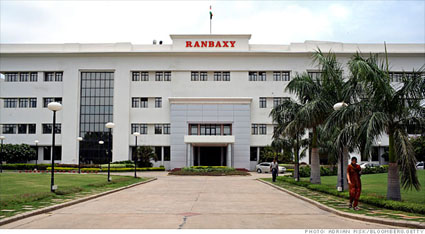Dirty medicine
By Katherine Eban
Fortune
May 15, 2013
The epic inside story of long-term criminal fraud at Ranbaxy, the Indian drug company that makes generic Lipitor for millions of Americans.

1. The assignment
On the morning of Aug. 18, 2004, Dinesh Thakur hurried to a hastily arranged meeting with his boss at the gleaming offices of Ranbaxy Laboratories in Gurgaon, India, 20 miles south of New Delhi. It was so early that he passed gardeners watering impeccable shrubs and cleaners still polishing the lobby’s tile floors. As always, Thakur was punctual and organized. He had a round face and low-key demeanor, with deep-set eyes that gave him a doleful appearance.
His boss, Dr. Rajinder Kumar, Ranbaxy’s head of research and development, had joined the generic-drug company just two months earlier from GlaxoSmithKline, where he had served as global head of psychiatry for clinical research and development. Tall and handsome with elegant manners, Kumar, known as Raj, had a reputation for integrity. Thakur liked and respected him.
Like Kumar, Thakur had left a brand-name pharmaceutical company for Ranbaxy. Thakur, then 35, an American-trained engineer and a naturalized U.S. citizen, had worked at Bristol-Myers Squibb (BMY) in New Jersey for 10 years. In 2002 a former mentor recruited him to Ranbaxy by appealing to his native patriotism. So he had moved his wife and baby son to Gurgaon to join India’s largest drugmaker and its first multinational pharmaceutical company.
When he stepped into Kumar’s office that morning, Thakur was surprised by his boss’ appearance. He looked weary and uneasy, his eyes puffy and dark. He had returned the previous day from South Africa, where he had met with government regulators. It was clear that the meeting had not gone well.
The two men strolled into the hall to order tea from white-uniformed waiters. As they returned, Kumar said, “We are in big trouble,” and motioned for Thakur to be quiet. Back in his office, Kumar handed him a letter from the World Health Organization. It summarized the results of an inspection that WHO had done at Vimta Laboratories, an Indian company that Ranbaxy hired to administer clinical tests of its AIDS medicine. The inspection had focused on antiretroviral (ARV) drugs that Ranbaxy was selling to the South African government to save the lives of its AIDS-ravaged population. Continue reading “Dirty Medicine: Ranbaxy’s Criminal Generic Drug Fraud”
